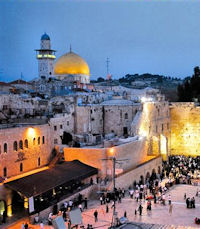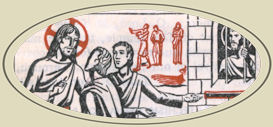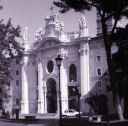» Enjoy our Liturgical Seasons series of e-books!
“As the journey of Advent continues, as we prepare to celebrate the nativity of Christ, John the Baptist's call to conversion sounds out in our communities. It is a pressing invitation to open our hearts and to welcome the Son of God Who comes among us to make divine judgement manifest. The Father, writes St. John the Evangelist, does not judge anyone, but has entrusted the power of judgement to the Son, because He is the Son of man.
“And it is today, in the present, that we decide our future destiny. It is with our concrete everyday behavior in this life that we determine our eternal fate. At the end of our days on earth, at the moment of death, we will be evaluated on the basis of our likeness or otherwise to the Baby Who is about to be born in the poor grotto of Bethlehem, because He is the measure God has given humanity.
“Through the Gospel John the Baptist continues to speak down the centuries to each generation. His hard clear words bring health to us, the men and women of this day in which even the experience and perception of Christmas often, unfortunately, reflects materialist attitudes. The 'voice' of the great prophet asks us to prepare the way for the coming Lord in the deserts of today, internal and external deserts, thirsting for the water of life which is Christ.” — Benedict XVI
The feast of St. Juan Diego, which is ordinarily celebrated today, is superseded by the Sunday liturgy.
Click here for commentary on the readings in the Extraordinary Form of the Roman Rite.
Jerusalem
In Palestine Christians gather today in Jerusalem for the celebration of holy Mass. In Rome they proceed to the stational church "Holy Cross at Jerusalem" which serves to give the atmosphere of the Holy City.
Why "Jerusalem"? Excavations of ancient sites often reveal a number of strata. When enemies destroyed a city, a new one would rise on the same location, so that today there are several layers of remains, one city, as it were, above the other. Our Jerusalem likewise has four strata. The bottommost layer is the Jerusalem of the Jews, that venerable land where the Lord Jesus began His mission of redemption, where He suffered and died. This is the historical Jerusalem so dear to us Christians. Anyone making a pilgrimage to the Holy Land enters that ancient city with holy awe. That Jerusalem, however, lies buried deep.
 For us another has been built upon it, the Jerusalem of Christians, God's kingdom on earth, the holy Church. This city still stands; it is the one which the divine King will enter at Christmas. Now we understand why we will hear so much about Jerusalem during the coming week. We should now clean and adorn our city, improving its streets and avenues through which the Savior will make His entrance. As a motto we should take the words of the precursor, St. John the Baptist: "Prepare the way of the Lord, make straight His paths; let every valley be filled, every hill be leveled." Holy Mother Church's message today is that the Savior is coming to the Jerusalem of the Christians, to the Church.
For us another has been built upon it, the Jerusalem of Christians, God's kingdom on earth, the holy Church. This city still stands; it is the one which the divine King will enter at Christmas. Now we understand why we will hear so much about Jerusalem during the coming week. We should now clean and adorn our city, improving its streets and avenues through which the Savior will make His entrance. As a motto we should take the words of the precursor, St. John the Baptist: "Prepare the way of the Lord, make straight His paths; let every valley be filled, every hill be leveled." Holy Mother Church's message today is that the Savior is coming to the Jerusalem of the Christians, to the Church.
Above the second stratum there arises a third, the heavenly Jerusalem at the end of time. Already now the Church sings of this Jerusalem. For during Advent we await the Savior who will appear on the Last Day to take all into "the new Jerusalem coming down from heaven."
Finally, there may be recognized a fourth Jerusalem, our souls in sanctifying grace. This city too must be adorned and prepared, for the King will want to enter. That is our present task.
On Epiphany, the climax to the current season, the Church will cry out: "Arise, shine, O Jerusalem, for the glory of the Lord has risen upon thee." That is the goal. Today we must prepare for the great King's visit to our city. The whole coming week must be devoted to it. The Church prays: "Awaken our hearts to prepare the way for Your only-begotten Son that we may serve Him with purified hearts."
In the time of the Roman Empire, rulers rode from city to city for the purpose of official visitations. Their appearance, called epiphany or parousia, was a great event, one preceded by months of preparation. Something analogous takes place in the Jerusalem of our souls. From a high watchtower we see the Lord coming afar off. Suddenly John the Baptist appears; he hurries into the city to announce the King's approach. God condescends to manifest Himself to us in grace; but He demands the proper reception.
Excerpted from The Church's Year of Grace by Pius Parsch
Commentary for the Readings in the Extraordinary Form:
Second Sunday of Advent
 Jesus referred John as "My messenger" who prepared the "way". John now wanted his disciples to realize that they, too, must follow Christ in this "way". Only through the same Jesus Christ, the long expected Savior, will the "blind" of soul "see;" the "lame' of character "walk;" the "lepers" of sin become "cleansed;" the "poor" become rich with a new Gospel. (Red figures in picture indicate the blink, the lame, the leper.)
Jesus referred John as "My messenger" who prepared the "way". John now wanted his disciples to realize that they, too, must follow Christ in this "way". Only through the same Jesus Christ, the long expected Savior, will the "blind" of soul "see;" the "lame' of character "walk;" the "lepers" of sin become "cleansed;" the "poor" become rich with a new Gospel. (Red figures in picture indicate the blink, the lame, the leper.)
The Epistle points to these interior and social aspects of the "Christ" way: interiorly, by prayer, to "glorify" the Fatherhood of God; socially by our actions, to "receive one another" in the Brotherhood of Man, "even as Christ has received you."
Excerpted from My Sunday Missal, Confraternity of the Precious Blood
Advent Reflection: Dare to Step Forward toward God's Mysterious Presence
From early times the Church's liturgy has set words from one of the psalms at the beginning of Advent, words in which Israel's Advent, the boundless waiting of that people, has found concentrated expression: "To thee, O Lord, I lift up my soul; O my God, in thee I trust . . ." (Ps 24:1). Such words may seem hackneyed to us, for we no longer attempt the adventures which lead man to his own inner self. While our maps of the earth have become more and more complete, man's inner self has become increasingly a terra incognita, an alien region, in spite of the fact that there are greater discoveries to be made there than in the visible universe.
To thee, O Lord, I lift up my soul: recently I came to a new awareness of the dramatic meaning behind this verse when reading an account which the French writer Julien Green recently published concerning his path to conversion to the Catholic Church. He tells how, in his youth, he was in bondage to "the pleasures of the flesh". He had no religious conviction to restrain him. And yet, the strange thing is that, now and again, he goes into a church with the unadmitted longing for some miracle to happen that would instantly set him free. "There was no miracle", he goes on, "but, from afar off, the sense of a presence." This presence warms him and seems to offer hope, but he is still repelled by the idea of salvation being connected with belonging to the Church. He desires this new presence but is unwilling to undertake renunciation; he wants to effect his own salvation, as it were, and without any serious effort. Thus he encounters Indian spirituality and hopes to find in it a better way. But he suffers the inevitable disappointment and begins to examine the Bible. He is so in earnest about this that he starts taking Hebrew lessons from a rabbi. One day the latter says to him: "Next Thursday I won't be coming since it's a holy day." "Holy day?" asks Green in surprise. "The Ascension—do I have to tell you that?" answers the rabbi. The young man in his earnest search is suddenly struck as by a thunderbolt: it is as if the words of the prophets were raining down upon him. "I was Israel", he says, "whom God was entreating to come home." I felt the application to myself of the words, "The ox knows its owner, and the ass its master's crib; but Israel does not know..." (Is 1:3).
This kind of experience of the truth of Scripture in our lives is what Advent is. This is what is meant by that verse, "I lift up my soul"; from being a hackneyed phrase it can become something new, adventurous and great if we begin to explore its truth.
Julien Green's account of his turbulent youth provides an amazingly accurate description of the struggles which our own age has to face. First of all there is the universal acceptance of the modern lifestyle, which on the one hand seems to us to be the inalienable form of our freedom yet is felt to be a slavery which it would take a miracle to abolish.
(And there is no question of the Church's old-fashioned ways being of any use here; the Church is not even regarded as an alternative. Exotic religions, by contrast, present a novel attraction.) And yet it is of great significance that the longing for liberation is not extinguished, that occasionally it asserts its influence in moments of quiet in a church. And it is this readiness to expose oneself to a mysterious presence, to accept it slowly and gradually, to allow it to penetrate, that enables Advent to take place, the first glimmer of light in however dark a night.
Sooner or later it becomes alarmingly clear: Yes,I am Israel. I am the ox that does not know its owner. And when, appalled, we get down from the pedestal of our pride, we find, as the Psalmist says, that our soul lifts itself up; it rises, and God's hidden presence penetrates ever deeper into our tangled lives.
Advent is not a miracle out of the blue such as is offered by the preachers of revolution and the heralds of new ways of salvation. God acts in an entirely human way with us, leading us step by step and waiting for us. The days of Advent are like a quiet knocking at the door of our smothered souls, inviting us to undertake the risk of stepping forward toward God's mysterious presence, which alone can make us free.
—Joseph Cardinal Ratzinger, Seek That Which is Above

Second Sunday of Advent
Station with Holy Cross In Jerusalem (Santa Croce in Gerusalemme):
The church in Rome appointed as the stational church for the Second Sunday of Advent is the Church of the Holy Cross in Jerusalem. Of old, salvation was of the Jews, but through them, and through this church, salvation is also given to the heathens. The Jerusalem, the Sion of today's liturgy, is the Holy Catholic Church, the vessel that contains Christ and his salvation. In the mind of the liturgy the figure applies also to each Christian soul, and to the church of stone in which we await the celebration of Mass in anticipation of the advent of our Redeemer (Baur, The Light of the World).
For more on Santa Croce in Gerusalemme, see:
For further information on the Station Churches, see The Stational Church.






